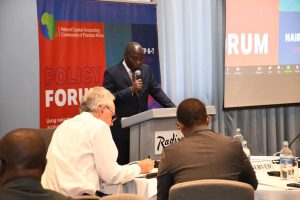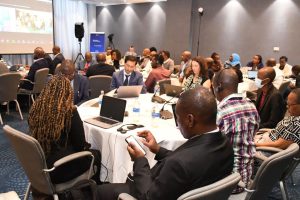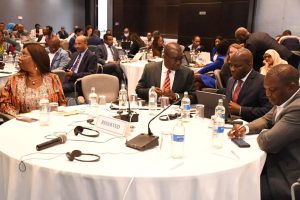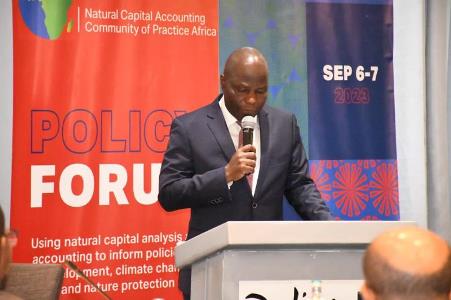Africa Natural Capital Accounting Forum
Economic Planning Principal Secretary, James Muhati officially opened the First Africa Natural Capital Accounting (NCA) Policy Forum that took place on 6/9/23 at a Nairobi Hotel. It coincided with the first Africa Climate Summit which took place in Nairobi from 4th to 6th September 2023.
The forum was organized by the Kenya National Bureau of Statistics in partnership with UN, World Bank and other international organizations.
Natural Capital Accounting is the process of calculating the total stocks and flows of the natural resources and services in a given ecosystem. The theme of this year’s Forum was, “Using Natural Capital Accounting and Analysis to inform Policies for Development, Climate Change and Natural Protection.”
The PS noted that Governments around the world are shifting their approach from exclusively focusing on economic growth to a more wholistic strategy that prioritizes human well-being and the sustainability of economic activities. Like many developing economies, the Kenyan economy is heavily dependent on the exploitation of finite natural resources that if depleted would pose serious challenges to the socio-economic development of the country.
The International Statistical Community developed an international statistical standard for natural capital accounting called the System of Environmental-Economic Accounting (SEEA), which is an integrated framework that shows the relationship between the environment and the economy. SEEA brings together economic and environmental information in an internationally agreed set of standard concepts, definitions, classifications, accounting rules and tables to produce internationally comparable statistics.
Kenya started work on SEEA accounts back in 2017 and developed the first pilot Energy accounts in 2018 with assistance from United Nations Statistics Division. The country has since then been producing these accounts on an annual basis as well as prioritized development of Water, Forest, Mineral and Ecosystem Accounts in the draft national plan, with the current focus being on Water Accounts.
The system reveals society’s complex relationship with nature and helps to identify which policies can be implemented to lower environmental pressures, while at the same time continuing to manage the economy effectively. The SEEA therefore plays an important role in governments’ desire to look Beyond-GDP and towards an economy that is focused on the promotion of well-being and sustainability.
It is important to note that Kenya’s development of SEEA efforts have really benefited from existing collaborations with various stakeholders including the United Nations Statistics Division, and it is our desire to leverage on this to actualize implementation of the proposed plan.
Additionally, High quality, timely data is critical for sound economic management, planning and implementation, monitoring and evaluation of various government programmes.
Kenya is currently reviewing and updating its National Plan for Advancing Environmental Economic Accounting (NP_AEEA) because it recognizes that for it to proceed with the next phases of developing Environmental Economic Accounts, it is imperative that it secures a buy-in from producers of statistical information that will feed into the SEEA framework. Properly resourced SEEA Accounts will also be able to regularly monitor up to fifty-four (54) indicators in the SDG framework, among other national and international obligations.
In Natural Capital Account, there is a great opportunity for Kenya and indeed other African to track their goals such as Sustainable Development goals whose 92 of the 248 indicators are related to environment. Likewise, goal 7 of Africa’s Agenda 2063 speaks to environmentally Sustainable and climate resilient economies and communities and other international agreements that Kenya is party to.
On his part, the Kenya National Bureau of Statistics Director General, MacDonald Obudho talked about climate change and the risks that face the future economic growth. He emphasized the importance of integrating national natural capacity building and accountability with the technical teams.
There were representatives from the State Department for Environment and Climate Change, Africa National Capital Accounting, Kenya National Bureau Statistics, World Bank, United Nations Statistics Division, United Nations Environment Programme among others.







